 “All created beings are unmanifest in their beginning, manifest in their interim state, and unmanifest again when they are annihilated. So what need is there for lamentation?” (Lord Krishna, Bhagavad-gita, 2.28)
“All created beings are unmanifest in their beginning, manifest in their interim state, and unmanifest again when they are annihilated. So what need is there for lamentation?” (Lord Krishna, Bhagavad-gita, 2.28)
There are many reasons to read the Bhagavad-gita, the Song of God sung on the battlefield of Kurukshetra some five thousand years ago. As revealed by the singer Himself, the same words were previously delivered many eons prior, at the beginning of creation. Therefore the Gita and its essential teachings are timeless, proving to be valuable in any time period and to any class of men. What’s more is that the primary fear, the root cause of distress, is addressed by this great work, proving that from a single set of teachings all other problems can be solved simultaneously.
What is that primary fear? What is the one thing that we worry about the most? Not surprisingly, it is death. Even if we have come to grips with our own eventual passing, there is still concern over the separation from friends and family members. “How will I live without them? I can’t believe that one day I will never see them again. ‘Never’ is such a frightening concept. Why can’t I have their association forever?” We know that this sadness is widespread based on the reaction to the passing of famous people, which also reveals how there is a lack of knowledge of the afterlife.
If true knowledge of the soul existed, there would be no reason to overly lament the passing of someone else. In reality, the lamentation is for ourselves, for we are now bereft of the departed’s company. But they continue to live on, as the spirit soul cannot be cut up, made wet, burned, or destroyed in any way.
“The soul can never be cut into pieces by any weapon, nor can he be burned by fire, nor moistened by water, nor withered by the wind.” (Lord Krishna, Bg. 2.23)
 There are many reasons to be averse to religious doctrines. For starters, so many religions are now organized and thus riddled with the common problems of politics, infighting, and the desire for personal aggrandizement, all of which are antithetical to a system of discipline aimed at connecting with the highest power. There is also the perceived notion that by hearing about and following religious dictates, one’s life will be stripped of fun. “No more sex life. No more eating meat. No more getting drunk. That all equals no fun.”
There are many reasons to be averse to religious doctrines. For starters, so many religions are now organized and thus riddled with the common problems of politics, infighting, and the desire for personal aggrandizement, all of which are antithetical to a system of discipline aimed at connecting with the highest power. There is also the perceived notion that by hearing about and following religious dictates, one’s life will be stripped of fun. “No more sex life. No more eating meat. No more getting drunk. That all equals no fun.”
But if we look at the Gita, we see that the starting point is the primary fear in every person. Thus the teachings that follow the initial inquiries from the perplexed warrior are applicable to every single person. In one sense the Gita doesn’t have to be considered a religious text, as it presents the information of the spirit soul and its travels in a scientific way. There are methods of redress that can be adopted, with a starting hypothesis declared, and the worker can see for themselves with the results of the experiments whether or not the principles presented are valid.
The speaker of the Gita is the oldest and wisest person. He has knowledge of every single past incident, so He knows that the principles of sanatana-dharma, or the eternal occupation of man, never fail when properly implemented. He can also see into the future, so there is no need for Him to observe any future results to experiments. On the battlefield that day, He presented His spotless knowledge in a manner that was suitable to the listener in the immediate vicinity. In the process the information was also shared with countless future generations who would study the text under the guidance of a bona fide spiritual master.
So what was the initial premise? What was the problem that sparked the talk? Arjuna was the leading fighter for a group of brothers known as the Pandavas. They had the rightful claim to the throne of Hastinapura, but their cousins unjustly usurped control. Now a war was to settle the matter, and right before hostilities were to start, Arjuna grew hesitant. He wasn’t worried about losing. It was just the opposite in fact; he was afraid of what would happen if his side won. So many people would die, and Arjuna wouldn’t like that. He didn’t want to live without the company of his well-wishers and relatives fighting for the other side, especially if he was the cause of their demise.
 Do Arjuna’s sentiments sound familiar? If they are alive today, are we not worried about the day when we will lose the association of our parents? Are we not afraid of losing a loved one either through a disease or a tragic accident? The answers Krishna gave to Arjuna allow for the individual spirit soul to be knowledgeable in its activities, and with that sword of knowledge one can slash away the ropes of doubt and illusion, which bind one in a trap of fear.
Do Arjuna’s sentiments sound familiar? If they are alive today, are we not worried about the day when we will lose the association of our parents? Are we not afraid of losing a loved one either through a disease or a tragic accident? The answers Krishna gave to Arjuna allow for the individual spirit soul to be knowledgeable in its activities, and with that sword of knowledge one can slash away the ropes of doubt and illusion, which bind one in a trap of fear.
What were Krishna’s primary instructions? Through a carefully presented series of verses, the Gita speaks of the spirit soul and how it is ageless. That soul existed prior to the present manifestation of the body and it will exist beyond the current form. The soul is the essence of identity, and its disposition is what matters most, not where the body is currently situated. This holds true for the individual and also for every other person, including people for whom we hold affection.
The person must act, however, and to know how to act one should follow the bona fide religious principles as they are presented by sadhu, shastra, and guru. The sadhu is the saintly man, who is devoted to the lotus feet of the Supreme Personality of Godhead. Shastra is scripture; it has the recorded instructions of the Supreme Lord and His representatives. The guru is the embodiment of devotion to God. He teaches by both precept and example. He can teach the humble student the meaning to the verses of shastra and how to practically apply the principles in everyday life.
After hearing from Krishna and accepting the information through discrimination, Arjuna decided to fight ahead, casting aside his previous doubt. Does this mean that Arjuna suddenly became callous to life and death? Did he discard his affection for his family members? If he did, isn’t the Gita kind of cold in its teaching? What is the difference, then, between a person who follows Krishna’s teachings and one who is so low in their moral standards that they kill other people at random, having no concern for them?
“The Blessed Lord said: While speaking learned words, you are mourning for what is not worthy of grief. Those who are wise lament neither for the living nor the dead.” (Bg. 2.11)
 The ultimate lesson of the Gita is to follow Krishna’s instructions, for He is the Supreme Lord. The vague concept of God is the same Krishna but without the features painted. There are incarnations and expansions of Krishna as well, which show off even more features, as many as the living entity can enumerate. Since Krishna is the fountainhead of all energies, following His word, showing love to Him, is actually the only way to have universal brotherhood. The only way to properly love all of God’s creation is to first serve the original creator.
The ultimate lesson of the Gita is to follow Krishna’s instructions, for He is the Supreme Lord. The vague concept of God is the same Krishna but without the features painted. There are incarnations and expansions of Krishna as well, which show off even more features, as many as the living entity can enumerate. Since Krishna is the fountainhead of all energies, following His word, showing love to Him, is actually the only way to have universal brotherhood. The only way to properly love all of God’s creation is to first serve the original creator.
This means that instead of losing his affection for his family members, Arjuna actually learned to love them more. But his affection was no longer based off temporary features belonging to a perishable body. Arjuna knew that everyone is a spirit soul and that by following occupational duties with detachment there is no sin incurred with action. Also, only the bodies of the other soldiers would be destroyed; their souls would continue to live on. Thus with this perfect combination of knowledge Arjuna could continue on without carrying the burden of the primary fear in man.
That same level of detachment comes to one who follows devotion to Krishna. The wise chariot-driver who enlightened Arjuna on that day can be reached through His holy names, “Hare Krishna Hare Krishna, Krishna Krishna, Hare Hare, Hare Rama Hare Rama, Rama Rama, Hare Hare”, which are non-different from Him. Chanting and hearing are the bedrock of bhakti-yoga, or devotional service. That discipline transcends sectarian boundaries and religious institutions. Devotion to God is the inherent occupation of the soul and from it the fears we regularly encounter today can vanish, creating a legitimate loving sentiment that extends to all creatures.
In Closing:
The greatest fear is that life will end,
Then creates other fears when it extends.
Even if with my own mortality I have come to grips,
How will I survive when close friends their bodies quit?
Arjuna thought just like this, fate of others to dwell upon,
To dispel his doubts, Shri Krishna sung transcendental song.
Known as Bhagavad-gita, at start deals with end of life,
Then solves other issues, anger, vengeance and strife.
Like Arjuna from the principles of bhakti don’t deviate,
In the process primary fear of life eliminate.
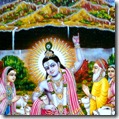 “He is called the well-wisher for the devotees only. He appears to be partial to His devotees, but factually the matter rests on the living being to accept or reject equal treatment by the Lord.” (Shrila Prabhupada, Shrimad Bhagavatam, 1.16.26-30 Purport)
“He is called the well-wisher for the devotees only. He appears to be partial to His devotees, but factually the matter rests on the living being to accept or reject equal treatment by the Lord.” (Shrila Prabhupada, Shrimad Bhagavatam, 1.16.26-30 Purport) From the rational human being’s perspective, it is understood that the fault lies completely with the person who forgets the umbrella. The umbrella gives protection from the rain, but it is still impartial. It doesn’t only protect one type of person. It does not look down to see who is holding it and then decide whether or not to block the scorching rays of the sun or the falling raindrops. In fact, you know that the umbrella gives protection; that’s why you kept one in your car. But in this situation you forgot, and though the umbrellas seem to be partial when they protect others, they are simply fulfilling their role.
From the rational human being’s perspective, it is understood that the fault lies completely with the person who forgets the umbrella. The umbrella gives protection from the rain, but it is still impartial. It doesn’t only protect one type of person. It does not look down to see who is holding it and then decide whether or not to block the scorching rays of the sun or the falling raindrops. In fact, you know that the umbrella gives protection; that’s why you kept one in your car. But in this situation you forgot, and though the umbrellas seem to be partial when they protect others, they are simply fulfilling their role.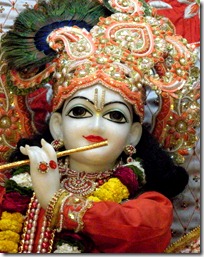 The Supreme Lord lives inside of us as the Supersoul and outside as the soul of all creatures. He is the existence of all existences, and not a blade of grass can move without His influence. Nevertheless, that influence is difficult to spot if we don’t know the proper use of objects. The hands we’re provided are meant to be used for such things as clapping along to the congregational songs glorifying the Supreme Lord. The eyes serve their ideal purpose when used to look at pictures of God and His beautiful form. The legs allow for travelling to places where the Supreme Lord is glorified, and the taste buds can eat the remnants of food first offered to Him,
The Supreme Lord lives inside of us as the Supersoul and outside as the soul of all creatures. He is the existence of all existences, and not a blade of grass can move without His influence. Nevertheless, that influence is difficult to spot if we don’t know the proper use of objects. The hands we’re provided are meant to be used for such things as clapping along to the congregational songs glorifying the Supreme Lord. The eyes serve their ideal purpose when used to look at pictures of God and His beautiful form. The legs allow for travelling to places where the Supreme Lord is glorified, and the taste buds can eat the remnants of food first offered to Him,  In the Bhagavad-gita, Krishna’s song that touches on the meaning of life, it is said that the Lord does not envy anyone, and neither is He partial to anyone. Nevertheless, He still shows favoritism to the devotees, who are friends to Him. This apparent contradiction is resolved by the fact that the offer for protection and favoritism is open to any person; but there is the requirement that they make the conscious decision to accept it. The Supreme Lord proved to be an umbrella of protection for the distressed Queen Draupadi when she surrendered everything to
In the Bhagavad-gita, Krishna’s song that touches on the meaning of life, it is said that the Lord does not envy anyone, and neither is He partial to anyone. Nevertheless, He still shows favoritism to the devotees, who are friends to Him. This apparent contradiction is resolved by the fact that the offer for protection and favoritism is open to any person; but there is the requirement that they make the conscious decision to accept it. The Supreme Lord proved to be an umbrella of protection for the distressed Queen Draupadi when she surrendered everything to 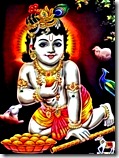 “If in any house He could not find any butter or curd to steal, He would go into a room and agitate the small children sleeping there by pinching them, and when they cried He would go away.” (Shrila Prabhupada, Shrimad Bhagavatam, 10.8.29 Purport)
“If in any house He could not find any butter or curd to steal, He would go into a room and agitate the small children sleeping there by pinching them, and when they cried He would go away.” (Shrila Prabhupada, Shrimad Bhagavatam, 10.8.29 Purport) If a dangerous situation arose, the prayers would go out to Vishnu for protection. Indeed, Yashoda herself recited the many names of Vishnu after her son Krishna would somehow escape from danger. In the Vedic tradition, Vishnu is the name given to the Supreme Lord that addresses His position of all-opulence. Vishnu is everywhere. Simply by exhaling He creates this and many other universes, and by inhaling the same immeasurably large collections of matter come back into Him. He is not an angry God or someone who demands that others worship Him. Just as the SDK provided by a software manufacturer allows the end-user to make whatever programs they like, the universe with its many small and large playing fields gives the occupants free rein when deciding which tasks to take up.
If a dangerous situation arose, the prayers would go out to Vishnu for protection. Indeed, Yashoda herself recited the many names of Vishnu after her son Krishna would somehow escape from danger. In the Vedic tradition, Vishnu is the name given to the Supreme Lord that addresses His position of all-opulence. Vishnu is everywhere. Simply by exhaling He creates this and many other universes, and by inhaling the same immeasurably large collections of matter come back into Him. He is not an angry God or someone who demands that others worship Him. Just as the SDK provided by a software manufacturer allows the end-user to make whatever programs they like, the universe with its many small and large playing fields gives the occupants free rein when deciding which tasks to take up. Vishnu as young Krishna was the emblem of attractiveness, so His vision would delight everyone. What good is having a delightful vision if no one gets to see it? Therefore Yashoda’s adorable child would roam through Vrindavana and do different naughty things. Sometimes He would break into the cowsheds and release the calves. They would then drink the milk from their mothers before anyone could extract the milk. The cow is so nice because it provides enough milk for both its children and the human population. But if the calves drink the milk first, there will be nothing left for the owners to consume. Thus the general procedure is to first milk the cows and then let the calves feed.
Vishnu as young Krishna was the emblem of attractiveness, so His vision would delight everyone. What good is having a delightful vision if no one gets to see it? Therefore Yashoda’s adorable child would roam through Vrindavana and do different naughty things. Sometimes He would break into the cowsheds and release the calves. They would then drink the milk from their mothers before anyone could extract the milk. The cow is so nice because it provides enough milk for both its children and the human population. But if the calves drink the milk first, there will be nothing left for the owners to consume. Thus the general procedure is to first milk the cows and then let the calves feed. Better than seeing God is hearing Him, and so the most potent method of religious practice is the
Better than seeing God is hearing Him, and so the most potent method of religious practice is the  “If one could achieve success without the sanction of the Lord then no medical practitioner would fail to cure a patient. Despite the most advanced treatment of a suffering patient by the most up-to-date medical practitioner, there is death, and even in the most hopeless case, without medical treatment, a patient is cured astonishingly. Therefore the conclusion is that God's sanction is the immediate cause for all happenings, good or bad.” (Shrila Prabhupada, Shrimad Bhagavatam, 1.14.9 Purport)
“If one could achieve success without the sanction of the Lord then no medical practitioner would fail to cure a patient. Despite the most advanced treatment of a suffering patient by the most up-to-date medical practitioner, there is death, and even in the most hopeless case, without medical treatment, a patient is cured astonishingly. Therefore the conclusion is that God's sanction is the immediate cause for all happenings, good or bad.” (Shrila Prabhupada, Shrimad Bhagavatam, 1.14.9 Purport) In the gradual progression towards bhava, or transcendental ecstasy, the devoted soul finds a non-different expansion of Vishnu they prefer and then dedicates their life to worshiping Him. There are choices available because there are natural tendencies within every person. Some will be automatically attracted to Shri Krishna, who is considered the original personality, the source of even Vishnu Himself. Krishna’s name says that He is all-attractive, and both the mental and physical portraits created from the descriptions found in sacred texts like the Shrimad Bhagavatam and
In the gradual progression towards bhava, or transcendental ecstasy, the devoted soul finds a non-different expansion of Vishnu they prefer and then dedicates their life to worshiping Him. There are choices available because there are natural tendencies within every person. Some will be automatically attracted to Shri Krishna, who is considered the original personality, the source of even Vishnu Himself. Krishna’s name says that He is all-attractive, and both the mental and physical portraits created from the descriptions found in sacred texts like the Shrimad Bhagavatam and  Hiranyakashipu took Vishnu to be his number one enemy, someone only purported to be God by the foolish people of the world. Thinking himself to be the master of his fate and the fate of others, the king tried to kill Prahlada in so many ways. Should have been easy work, no? Prahlada was just a boy, so how could he protect himself? During the attacks instigated by his father the devoted soul thought of Vishnu and was thus saved each and every time. Throwing him off a cliff, placing him in a raging fire, feeding him to a pack of snakes, and leaving him at the bottom of the ocean could not kill Prahlada. The boy wasn’t a Houdini-type magician either; Vishnu just protected him every time.
Hiranyakashipu took Vishnu to be his number one enemy, someone only purported to be God by the foolish people of the world. Thinking himself to be the master of his fate and the fate of others, the king tried to kill Prahlada in so many ways. Should have been easy work, no? Prahlada was just a boy, so how could he protect himself? During the attacks instigated by his father the devoted soul thought of Vishnu and was thus saved each and every time. Throwing him off a cliff, placing him in a raging fire, feeding him to a pack of snakes, and leaving him at the bottom of the ocean could not kill Prahlada. The boy wasn’t a Houdini-type magician either; Vishnu just protected him every time.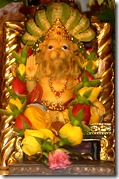 As the sanction from the Supreme Lord is required for either extending or ending life, He naturally becomes the object of appreciation. If the life we have must end anyway, why not spend it worshiping the person who is in control? From that worship followed in the highest mood of devotion you actually gain intelligence about birth and death and how it repeats in a cycle. Just from the proper type of worship you reach a point where the artificial prolonging of life is no longer desired. As the spirit soul is eternal, the devotee asks only to be allowed to continue their devotional efforts in life after life, wherever they may end up. As Narasimhadeva showed with Prahlada, the Supreme Personality of Godhead comes to the rescue of the surrendered souls and grants them that highest benediction of achieving a consciousness that is eternally pure.
As the sanction from the Supreme Lord is required for either extending or ending life, He naturally becomes the object of appreciation. If the life we have must end anyway, why not spend it worshiping the person who is in control? From that worship followed in the highest mood of devotion you actually gain intelligence about birth and death and how it repeats in a cycle. Just from the proper type of worship you reach a point where the artificial prolonging of life is no longer desired. As the spirit soul is eternal, the devotee asks only to be allowed to continue their devotional efforts in life after life, wherever they may end up. As Narasimhadeva showed with Prahlada, the Supreme Personality of Godhead comes to the rescue of the surrendered souls and grants them that highest benediction of achieving a consciousness that is eternally pure. “The king went and received blessings and then paid so much honor and respect after that. When he saw Rama, he experienced a happiness one hundred times that of Brahman realization.” (Janaki Mangala, Chand 5.2)
“The king went and received blessings and then paid so much honor and respect after that. When he saw Rama, he experienced a happiness one hundred times that of Brahman realization.” (Janaki Mangala, Chand 5.2) The Vedas reveal that everything in life that we know about is temporary in its manifestation. Those who are illusioned by the temporary easily lose perspective, both in the short and long term. That which is permanent, knowledgeable and blissful is the opposite of the material nature. The Vedas refer to this force as Brahman, and its realization is the main objective of the living entity gifted with a human birth. Within a human body the dichotomy between Brahman and maya can be studied. The most mature living entity can follow instruction and guidance to train the senses to cope with hardship. The marathon runner can run for long distances without any discomfort, while the person new to running finds one mile difficult to complete. The difference between the two individuals is in the training of the body.
The Vedas reveal that everything in life that we know about is temporary in its manifestation. Those who are illusioned by the temporary easily lose perspective, both in the short and long term. That which is permanent, knowledgeable and blissful is the opposite of the material nature. The Vedas refer to this force as Brahman, and its realization is the main objective of the living entity gifted with a human birth. Within a human body the dichotomy between Brahman and maya can be studied. The most mature living entity can follow instruction and guidance to train the senses to cope with hardship. The marathon runner can run for long distances without any discomfort, while the person new to running finds one mile difficult to complete. The difference between the two individuals is in the training of the body. Brahman realization is meant to continue uninterrupted. You can know theoretically that you are spirit soul and not body, but practically every activity you are inclined towards from birth follows the realization of maya, which requires no effort. Thus to attain and stay on the Brahman platform is quite difficult. King Janaka a long time ago mastered the art of real yoga to keep the Brahman vision within his mind at all times. He still followed work. He did not become a robot or give up his obligations without cause. Brahman realization can occur through any type of activity, provided it is authorized and the worker keeps the proper vision within the mind.
Brahman realization is meant to continue uninterrupted. You can know theoretically that you are spirit soul and not body, but practically every activity you are inclined towards from birth follows the realization of maya, which requires no effort. Thus to attain and stay on the Brahman platform is quite difficult. King Janaka a long time ago mastered the art of real yoga to keep the Brahman vision within his mind at all times. He still followed work. He did not become a robot or give up his obligations without cause. Brahman realization can occur through any type of activity, provided it is authorized and the worker keeps the proper vision within the mind.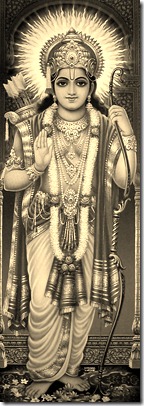 That form is meant to provide happiness to the observer. The eyes have a purpose. Through fulfilling that purpose they provide a fruit that can be enjoyed. More than anything the eyes exist to gaze upon the sweet, charming, lovely, and beautiful vision of the Supreme Personality of Godhead, who so innocently goes about His business, caring for the welfare of His
That form is meant to provide happiness to the observer. The eyes have a purpose. Through fulfilling that purpose they provide a fruit that can be enjoyed. More than anything the eyes exist to gaze upon the sweet, charming, lovely, and beautiful vision of the Supreme Personality of Godhead, who so innocently goes about His business, caring for the welfare of His  “Exploitation of the weaker living being by the stronger is the natural law of existence; there is always an attempt to devour the weak in different kingdoms of living beings. There is no possibility of checking this tendency by any artificial means under material conditions; it can be checked only by awakening the spiritual sense of the human being by practice of spiritual regulations.” (Shrila Prabhupada, Shrimad Bhagavatam, 1.13.47 Purport)
“Exploitation of the weaker living being by the stronger is the natural law of existence; there is always an attempt to devour the weak in different kingdoms of living beings. There is no possibility of checking this tendency by any artificial means under material conditions; it can be checked only by awakening the spiritual sense of the human being by practice of spiritual regulations.” (Shrila Prabhupada, Shrimad Bhagavatam, 1.13.47 Purport) The marathon is but one short activity in a list of many that will take place in the journey through a single lifetime. That same vibrant force for action flows through the cycle of birth and death perpetually until desire is purified. The nature of the land of residence is such that it fosters attachment to temporary objects. It keeps the otherwise knowledgeable living entity in ignorance of his real position, that of servant of God. The playing field exists to facilitate the pursuit for equaling or even surpassing the Supreme Lord in the areas of beauty, wealth, knowledge, renunciation, strength and fame.
The marathon is but one short activity in a list of many that will take place in the journey through a single lifetime. That same vibrant force for action flows through the cycle of birth and death perpetually until desire is purified. The nature of the land of residence is such that it fosters attachment to temporary objects. It keeps the otherwise knowledgeable living entity in ignorance of his real position, that of servant of God. The playing field exists to facilitate the pursuit for equaling or even surpassing the Supreme Lord in the areas of beauty, wealth, knowledge, renunciation, strength and fame. How will this style of worship curb exploitation? The purification of desire is what does the trick. For instance, instead of harboring jealously for the rich, the devoted soul knows that no amount of material wealth can make one happy. True happiness comes from having the ability to stay in Krishna’s company, to be able to chant His name and remember His sweet smile. The ears are gifts from God that allow us to hear the sweet pastimes of the Supreme Personality of Godhead, who protects His
How will this style of worship curb exploitation? The purification of desire is what does the trick. For instance, instead of harboring jealously for the rich, the devoted soul knows that no amount of material wealth can make one happy. True happiness comes from having the ability to stay in Krishna’s company, to be able to chant His name and remember His sweet smile. The ears are gifts from God that allow us to hear the sweet pastimes of the Supreme Personality of Godhead, who protects His  But if I should chant the holy names of Krishna and Rama, all of a sudden my low birth turns into a high birth, wherein I am deserving of honor and respect from others. That status results from the ability to shed transcendental light on others. Therefore the devotee is a saint at heart and always above useless competition. The true saint knows what is best for everyone and tries to distribute that knowledge freely, without concern for the reception. The devotee saint knows how to extract the loving sentiments from every single person, giving them the greatest gift of all: the ability to practice divine love.
But if I should chant the holy names of Krishna and Rama, all of a sudden my low birth turns into a high birth, wherein I am deserving of honor and respect from others. That status results from the ability to shed transcendental light on others. Therefore the devotee is a saint at heart and always above useless competition. The true saint knows what is best for everyone and tries to distribute that knowledge freely, without concern for the reception. The devotee saint knows how to extract the loving sentiments from every single person, giving them the greatest gift of all: the ability to practice divine love.